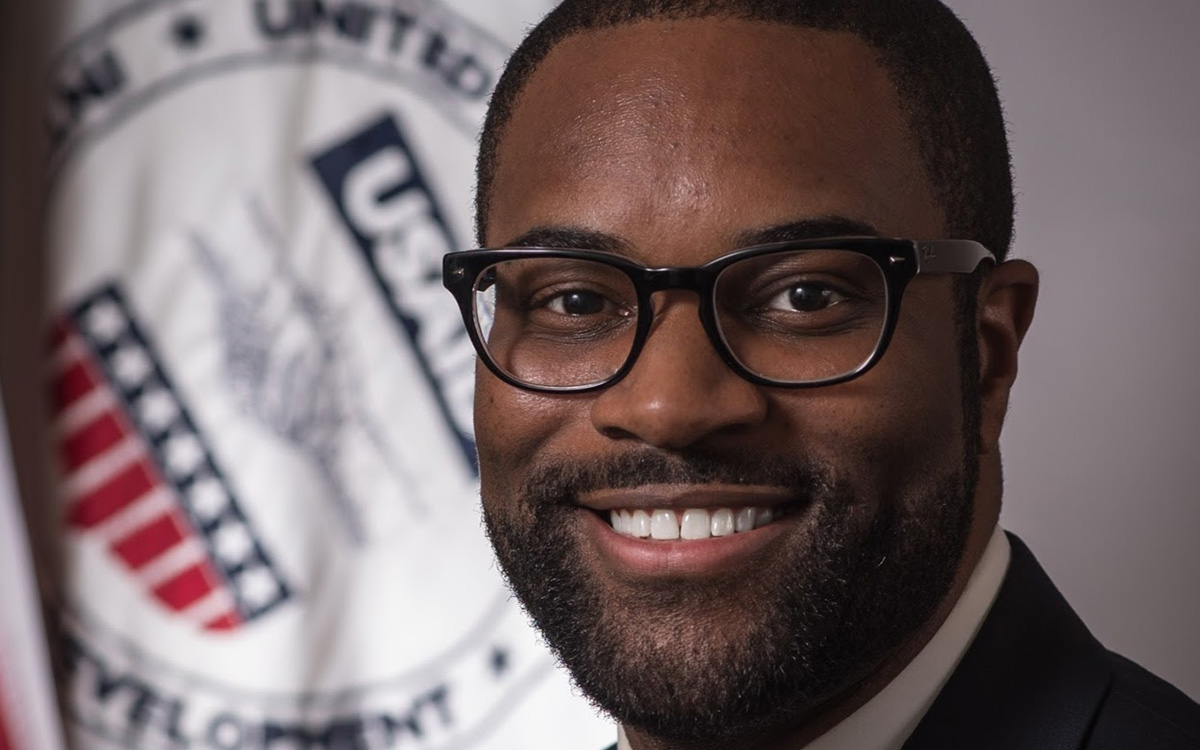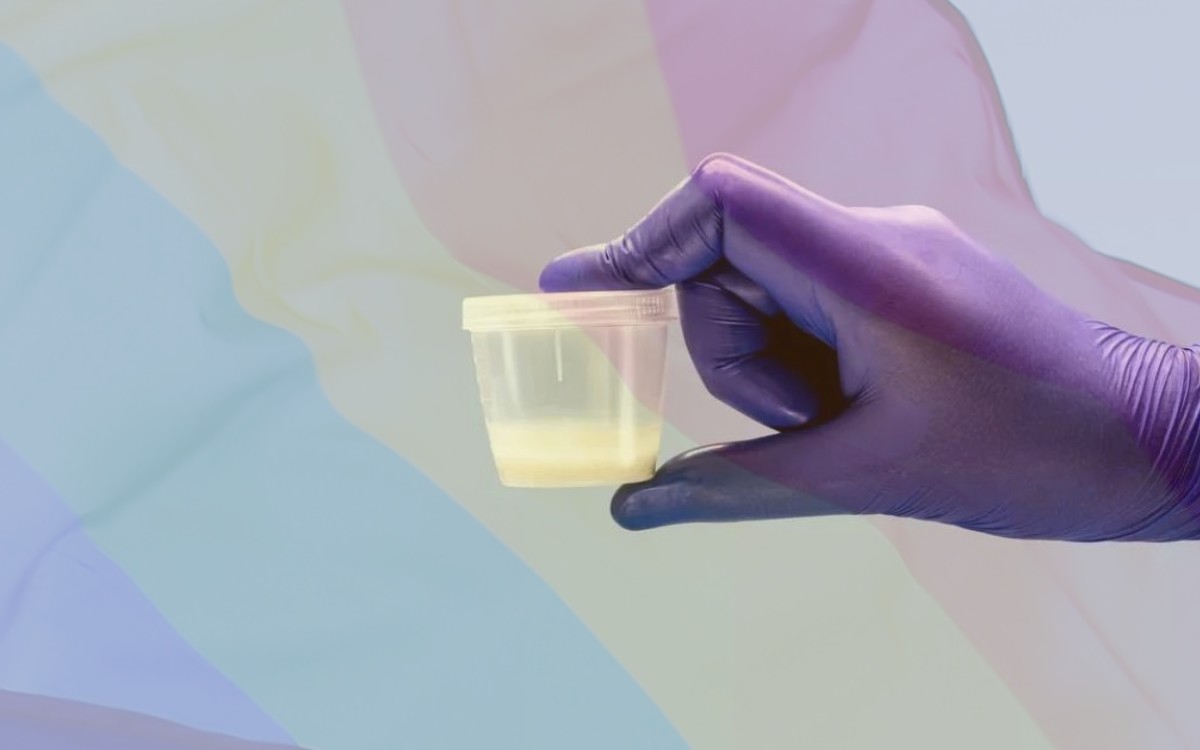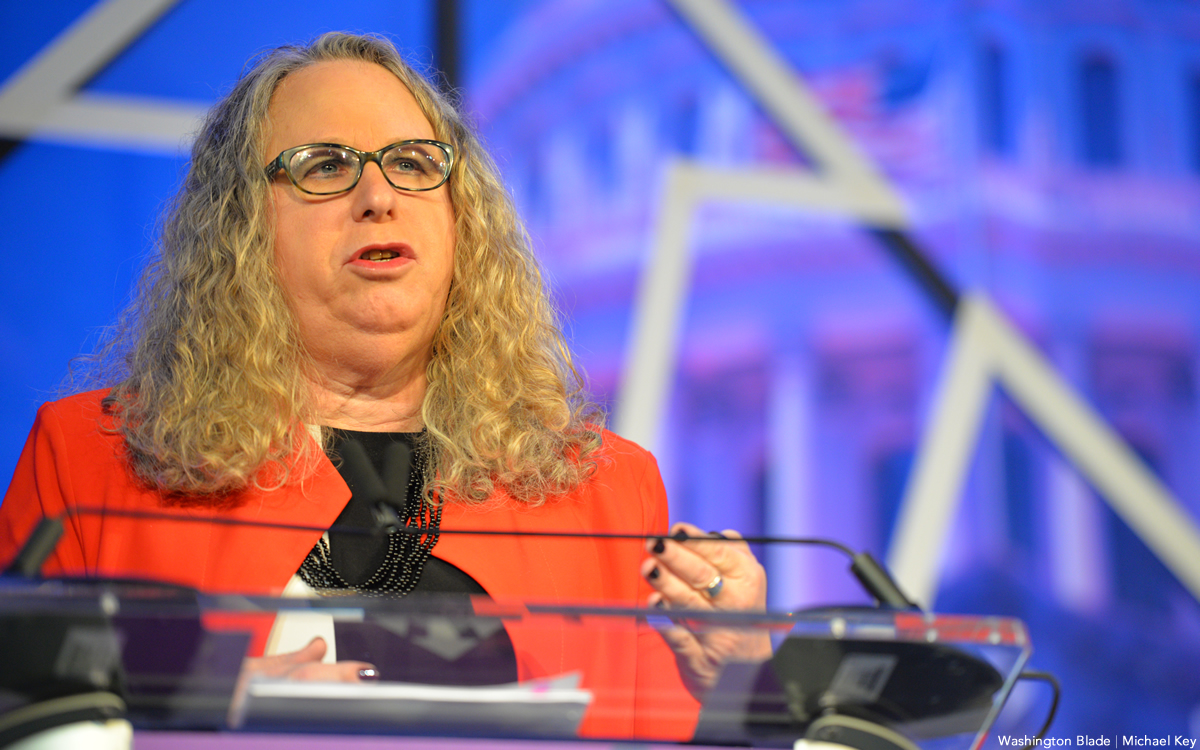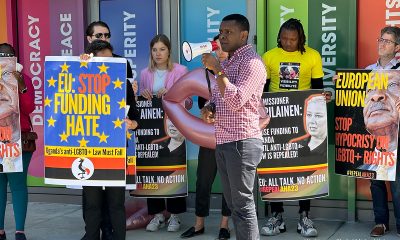Federal Government
EXCLUSIVE: USAID LGBTQ coordinator visits Uganda
Jay Gilliam met with activists, community members from Feb. 19-27

U.S. Agency for International Development Senior LGBTQI+ Coordinator Jay Gilliam last month traveled to Uganda.
Gilliam was in the country from Feb. 19-27. He visited Kampala, the Ugandan capital, and the nearby city of Jinja.
Gilliam met with LGBTQ activists who discussed the impact of the Anti-Homosexuality Act, a law with a death penalty provision for “aggravated homosexuality” that President Yoweri Museveni signed last May. Gilliam also sat down with USAID staffers.
Gilliam on Wednesday during an exclusive interview with the Washington Blade did not identify the specific activists and organizations with whom he met “out of protection.”
“I really wanted to meet with community members and understand the impacts on them,” he said.
Consensual same-sex sexual relations in Uganda were already criminalized before Museveni signed the Anti-Homosexuality Act. Gilliam told the Blade he spoke with a person who said authorities arrested them at a community meeting for mental health and psychosocial support “under false pretenses of engaging in same-sex relations and caught in a video that purportedly showed him.”
The person, according to Gilliam, said authorities outed them and drove them around the town in which they were arrested in order to humiliate them. Gilliam told the Blade that prisoners and guards beat them, subjected them to so-called anal exams and denied them access to antiretroviral drugs.
“They were told that you are not even a human being. From here on you are no longer living, just dead,” recalled Gilliam.
“I just can’t imagine how difficult it is for someone to be able to live through something like that and being released and having ongoing needs for personal security, having to be relocated and getting support for that and lots of other personal issues and trauma,” added Gilliam.
Gilliam said activists shared stories of landlords and hotel owners evicting LGBTQ people and advocacy groups from their properties. Gilliam told the Blade they “purport that they don’t want to run afoul of” the Anti-Homosexuality Act.
“These evictions really exacerbate the needs from the community in terms of relocation and temporary shelter and just the trauma of being kicked out of your home, being kicked out of your village and having to find a place to stay at a moment’s notice, knowing that you’re also trying to escape harm and harassment from neighbors and community members,” he said.
Gilliam also noted the Anti-Homosexuality Act has impacted community members in different ways.
Reported cases of violence and eviction, for example, are higher among gay men and transgender women. Gilliam noted lesbian, bisexual and queer women and trans men face intimate partner violence, are forced into marriages, endure corrective rape and lose custody of their children when they are outed. He said these community members are also unable to inherit land, cannot control their own finances and face employment discrimination because of their sexual orientation or gender identity.
US sanctioned Ugandan officials over Anti-Homosexuality Act
The U.S imposed visa restrictions on Ugandan officials shortly after Museveni signed the law. The World Bank Group later announced the suspension of new loans to Uganda.
The Biden-Harris administration last October issued a business advisory that said the Anti-Homosexuality Act “further increases restrictions on human rights, to include restrictions on freedoms of expression and peaceful assembly and exacerbates issues regarding the respect for leases and employment contracts.” The White House has also removed Uganda from a program that allows sub-Saharan African countries to trade duty-free with the U.S. and has issued a business advisory for the country over the Anti-Homosexuality Act.
Secretary of State Antony Blinken on Dec. 4, 2023, announced sanctions against current and former Ugandan officials who committed human rights abuses against LGBTQ people and other groups. Media reports this week indicate the U.S. denied MP Sarah Achieng Opendi a visa that would have allowed her to travel to New York in order to attend the annual U.N. Commission on the Status of Women.
Museveni, for his part, has criticized the U.S. and other Western countries’ response to the Anti-Homosexuality Act.
Gilliam noted authorities have arrested and charged Ugandans under the law.
Two men on motorcycles on Jan. 3 stabbed Steven Kabuye, co-executive director of Coloured Voice Truth to LGBTQ Uganda, outside his home while he was going to work. The incident took place months after Museveni attended Uganda’s National Prayer Breakfast at which U.S. Rep. Tim Walberg (R-Mich.) spoke and defended the Anti-Homosexuality Act.
The State Department condemned the attack that Kabuye blamed on politicians and religious leaders who are stoking anti-LGBTQ sentiments in Uganda. Gilliam did not meet with Ugandan government officials while he was in the country.
“We in the U.S. government have already made it clear our stance with government officials on how we feel about the AHA, as well as broader human rights concerns in country,” said Gilliam. “That’s been communicated from the very highest levels.”
The Uganda’s Constitutional Court last Dec. 18 heard arguments in a lawsuit that challenges the Anti-Homosexuality Act. It is unclear when a ruling in the case will take place, but Gilliam said LGBTQ Ugandans with whom he met described the law “as just one moment.”
“Obviously there is lots of work that has been done, that continues to be done to respond to this moment,” he told the Blade. “They know that there’s going to be a lot of work that needs to continue to really address a lot of the root causes and to really back humanity to the community.”
Gilliam further noted it will “take some years to recover from the damage of 2023 and the AHA (Anti-Homosexuality Act) there.” He added activists are “already laying down the groundwork for what that work looks like” in terms of finding MPs, religious leaders, human rights activists and family members who may become allies.
“Those types of allyships are going to be key to building back the community and to continue the resiliency of the movement,” said Gilliam.
Federal Government
Lambda Legal praises Biden-Harris administration’s finalized Title IX regulations
New rules to take effect Aug. 1

The Biden-Harris administration’s revised Title IX policy “protects LGBTQ+ students from discrimination and other abuse,” Lambda Legal said in a statement praising the U.S. Department of Education’s issuance of the final rule on Friday.
Slated to take effect on Aug. 1, the new regulations constitute an expansion of the 1972 Title IX civil rights law, which prohibits sex-based discrimination in education programs that receive federal funding.
Pursuant to the U.S. Supreme Court’s ruling in the landmark 2020 Bostock v. Clayton County case, the department’s revised policy clarifies that discrimination on the basis of sexual orientation and gender identity constitutes sex-based discrimination as defined under the law.
“These regulations make it crystal clear that everyone can access schools that are safe, welcoming and that respect their rights,” Education Secretary Miguel Cardona said during a call with reporters on Thursday.
While the new rule does not provide guidance on whether schools must allow transgender students to play on sports teams corresponding with their gender identity to comply with Title IX, the question is addressed in a separate rule proposed by the agency in April.
The administration’s new policy also reverses some Trump-era Title IX rules governing how schools must respond to reports of sexual harassment and sexual assault, which were widely seen as imbalanced in favor of the accused.
Jennifer Klein, the director of the White House Gender Policy Council, said during Thursday’s call that the department sought to strike a balance with respect to these issues, “reaffirming our longstanding commitment to fundamental fairness.”
“We applaud the Biden administration’s action to rescind the legally unsound, cruel, and dangerous sexual harassment and assault rule of the previous administration,” Lambda Legal Nonbinary and Transgender Rights Project Director Sasha Buchert said in the group’s statement on Friday.
“Today’s rule instead appropriately underscores that Title IX’s civil rights protections clearly cover LGBTQ+ students, as well as survivors and pregnant and parenting students across race and gender identity,” she said. “Schools must be places where students can learn and thrive free of harassment, discrimination, and other abuse.”
Federal Government
FDA plans to lift ban on gay, bisexual sperm donors
Ban has been in place since 2005

The Food and Drug Administration is planning to lift its ban on sperm donations from men who have sex with men, according to a report in the Wall Street Journal. The report also says the FDA would simultaneously lift the ban on donations of other tissues and organs from gay and bisexual men.
The Wall Street Journal report suggests that the FDA could put out a draft of the new policy for public comment by the summer, with a final rule in place by the end of 2024 or early 2025.
Reached for comment, a spokesperson for the FDA would not confirm the Wall Street Journal story, but acknowledged that, “the FDA routinely reviews approaches regarding donor screening and testing for donors of human cells, tissues and cellular and tissue-based products (HCT/Ps) to determine what changes, if any, are appropriate based on technological and evolving scientific knowledge.”
The FDA imposed the sperm donation ban on men who have sex with men in 2005, as part of an expansion on existing prohibitions on blood donations from gay and bisexual men which were meant to mitigate the risk that HIV could be spread through donations.
The policies stemmed from an erroneous belief that gay men were more likely to carry HIV, regardless of their individual behaviors and risk factors.
Last year, the FDA finally ended the ban on blood donations from men who have sex with men, which had been in place since the early days of the AIDS crisis. The FDA now requires that blood donors are screened based on individual behaviors in a gender-neutral manner, in addition to the donations themselves being tested for HIV and other blood-borne illnesses.
Alice Ruby, executive director of the Sperm Bank of California in Berkeley, says the lifting of the blood ban should provide a template for ending the sperm ban.
“I’m hoping it’s similar to the blood donation screening, where it’s based on behaviour, rather than being part of a population,” she says. “We test donors repeatedly for HIV as required by the FDA.”
The Sperm Bank of California has served many lesbian, bisexual and transgender people and Ruby says that she’s often told her clients would like a queer donor, to ensure that the biological father won’t be someone who disapproves of queer families. The ban removes that choice from would-be mothers.
The Sperm Bank of California has been opposed to the gay sperm donation ban since the policy was first proposed 20 years ago and has advocated in tandem with the National Center for Lesbian Rights for the policy to be scrapped.
“People are pretty unaware that the ban exists. I think there’s a lot of gay men who would be happy to contribute in this way, especially since a large number of people using sperm donation are LGBT couples and single people,” Ruby says.
Sperm banks across the country have been experiencing shortages of donor sperm, especially from donors of color. Opening the donor pool to gay and bi men could help ease the shortage. Ruby has told the Blade that the Sperm Bank of California has had to turn away gay and bi donors every week, up to 400 men in a single year.
When the FDA releases its draft policy around sperm donation, there will be a public comment period before the regulation is made final. Ruby says anyone interested opening up sperm donation to gay and bisexual men should submit a comment to support the change.
Federal Government
Adm. Levine celebrates trans joy on Transgender Day of Visibility
‘We continue to live a life of joy in the face of adversity’

The day after Sunday’s Transgender Day of Visibility observance, the Washington Blade connected with Adm. Rachel Levine, a pediatrician serving as assistant secretary of health at the U.S. Department of Health and Human Services.
“Trans joy means authenticity and being comfortable in your own skin and being able to be who you are,” said Levine, who is the highest-ranking transgender official in U.S. history.
“With my transition, I was able to be my authentic self,” she remembers. “At that time, I was still a professor at the Penn State College of Medicine, and an attending physician at the Penn State Hershey Medical Center in pediatrics and adolescent medicine, but then I had this unique opportunity to become the physician general of Pennsylvania for then-Gov. Tom Wolf, and then two and a half years later to become the Secretary of Health.”
“So it has been a tremendous journey, which has been very rewarding,” Levine said, adding that it has been “an honor” to work for the Biden-Harris administration under HHS Secretary Xavier Becerra — all allies of trans, nonbinary, and gender expansive folks and of the LGBTQ community more broadly.
Levine recounted how Transportation Secretary Pete Buttigieg, himself the first openly gay Senate-confirmed Cabinet secretary, had singled her out as one of the administration’s other high-ranking LGBTQ appointees during a 2021 Pride celebration at the White House.
At that moment, President Joe Biden “looked me in the eye and, you know, kind of gestured for me to stand up for the applause,” she remembered, and “I thought that that was just truly meaningful and shows his compassion and his attention to the people working for him and his administration.”
At the same time, Levine’s tenure has, unfortunately, come with bigoted attacks from the likes of U.S. Rep. Marjorie Taylor Greene (R-Ga.), but she said part of trans joy means “we fight hate with love, and we continue to live a life of joy in the face of adversity.”
“For me personally, I am able to compartmentalize those attacks,” she said. “You know, and I’ve learned this in my clinical work as a pediatrician, where, if you are in the emergency department or in the office or in the hospital and you have a very sick patient in front of you, you have to be able to function as a professional and compartmentalize your feelings and then be able to bring them out later and process them.”
Levine explained, “And so it’s the same thing so that if I am attacked, I’m able to compartmentalize any emotions about that and then I work that through with my friends and my family.”
“In addition, though, I’ve also learned the art of sublimation where, you know, the more people attack me, then I’m able to turn that around and it serves as motivation for me to work harder and advocate more.”
Rather than herself, Levine said, “What I worry about are the most vulnerable in our community, who I think it can be very challenging for, particularly in these times, to vulnerable transgender and nonbinary youth, their families, and even their medical providers in many states across the country.”
Levine shared her thoughts about the public’s eroding faith in science, medicine, and institutional expertise — themes that often arise in the context of debates over gender affirming healthcare, as guideline-directed and medically necessary interventions that are supported by every mainstream medical society have come under fire from right-wing politicians.
“There is a lot of misinformation and overt disinformation about transgender medicine,” she said. “You know, transgender medicine is an evidence-based standard of care, which continues to benefit from continued research and evolution from, you know, standards 10 or more years ago to the current standards now published.”
Levine added, “Transgender medicine is absolutely necessary for transgender and gender diverse people including youth — and transgender medicine is medical care, but it’s also mental health care, and it’s literally suicide prevention care” that has “been shown in study after study to improve the quality of life and can literally save lives.”
Transgender medicine “for young people [is often] conducted at many of our nation’s expert children’s hospitals,” Levine said. “Let me put it this way: if you have a child with a fever, you would take your child, perhaps, to a pediatrician. If they had severe diabetes, you would take them to a pediatric endocrinologist. If they had a mental health condition, you might take them to a child psychiatrist or psychologist.”
“So,” she said, “if you have a child with gender questions or gender issues then you’re going to take them to the pediatric and adolescent gender specialist, and it’s often a team — including the same endocrinologist and it might be the same psychiatrist or psychologist.”
“You’re not going to think, ‘oh, I’m going to call my state legislator.'”
Nevertheless, Levine said, “These issues have been politicized for political and ideological reasons” over the objections of physicians like Jesse Ehrenfeld, president of the American Medical Association, who during a panel discussion with Levine for the PFLAG National convention in November, agreed that politicians should not get between patients, their families, and their healthcare providers.
“We see other areas where there’s misinformation and disinformation,” Levine said, perhaps partly a consequence of the politicization of the public health response to the COVID pandemic, which has led to vaccine hesitancy for COVID as well as childhood immunizations.
Ultimately, she said, “physicians and other medical and public health professionals are trying to help people,” which is “what I tried to do when I was in academic medicine” where “I really worked to help people, the patients and families that I saw as well as teaching as well as clinical research — and I think, overall, that’s what most physicians and medical professionals and public health professionals are doing.”
Exciting work ahead at HHS
When it comes to the work in which her agency is engaged, Levine said “health equity is fundamental to everything that we’re doing at HHS under Secretary Becerra and so many of our key policy initiatives relate to health equity.”
“So,” she said, “that includes health equity for the LGBTQI+ community, working to end the HIV epidemic in the United States with a focus on health equity, working to safeguard LGBTQI+ youth from the harms of conversion therapy, promoting data equity for our community, SAMHSA’s work on on conversion therapy, ARC’s work in terms of a sample patient intake form to improve the patient care experience for LGBTQI+ people, and more.”
“We have an office of climate change and health equity with a sister office of environmental justice,” Levine added. “We’re working on health equity in terms of reproductive health and reproductive rights, in the face of the Dobbs decision,” which revoked the constitutional right to abortion.
“We’re working in terms of health equity in regards to food and nutrition,” she said, “in terms of long COVID, and more.”
As with many initiatives under Biden’s presidency, “There is a tremendous emphasis on breaking down silos within divisions at HHS and between departments,” Levine said.
She shared a few examples: “One is our work on long COVID. We have an office of long COVID research and practice, which is really working across the administration with that whole of government approach. Another is in terms of our work on climate change and health equity with the EPA, and the White House Climate Council.”
“And then another actually would be our work on syphilis,” Levine said. “We run — and I chair — a syphilis and congenital syphilis federal government task force, which includes all the divisions at HHS, but also includes the VA and the Department of Defense, trying to address the significant increases in syphilis and congenital syphilis that we’ve seen the United States.”
And then, “Another example within the LGBTQ space is a global interagency action plan about conversion therapy, which includes HHS, the Department of State, the Department of the Treasury, and USAID.”
-

 State Department4 days ago
State Department4 days agoState Department releases annual human rights report
-

 South America2 days ago
South America2 days agoArgentina government dismisses transgender public sector employees
-

 District of Columbia2 days ago
District of Columbia2 days agoCatching up with the asexuals and aromantics of D.C.
-

 Politics4 days ago
Politics4 days agoSmithsonian staff concerned about future of LGBTQ programming amid GOP scrutiny










